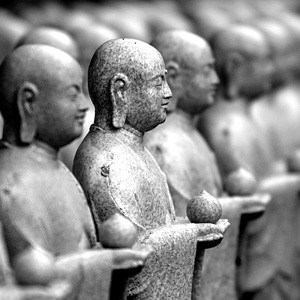Auxiliary bodhisattva vows: Vow 22
Auxiliary bodhisattva vows: Part 5 of 9
Part of a series of teachings based on the The Gradual Path to Enlightenment (Lamrim) given at Dharma Friendship Foundation in Seattle, Washington, from 1991-1994.
- The laziness of sloth and sleep
- The laziness of business
- The laziness of discouragement
LR 086: Auxiliary vows (download)
Auxiliary vow 22
To abandon: Not dispelling the 3 types of laziness.
What this is saying is, laziness is the thing that blocks our joyous effort. It’s the thing that counteracts it, so what we should try and do is make efforts to counteract our laziness.
One kind of laziness is attachment to sleep and lying around. The teachers say to try and sleep what your body needs, not excessively. Sleep on a regular schedule, not sleeping a long stretch, and then not sleeping, then another long stretch, then not sleeping. Don’t get into the habit of sleeping in the daytime, unless somehow your body doesn’t work without it. If you get into the habit of sleeping in the daytime, then you sleep in the daytime, you sleep in the night-time, you wake up for meals and that’s it. Really try not to just give in to the mind that just wants to sleep and sleep and sleep. Get ourselves into a schedule, something that’s regular, and not sleep excessively.
To counteract the attachment to sleep, it’s good to remember impermanence and death.
Audience: Is the first type of laziness also called the laziness of procrastination?
Venerable Thubten Chodron: Yes, procrastination is involved with the attachment to sloth and sleep. The mañana mentality.
The second kind of laziness is attraction to running around and being busy. Keeping ourselves busy, busy, busy. We usually see busy-ness as being the opposite of laziness, but in terms of the Dharma, worldly busy-ness is definitely Dharma-laziness. We keep ourselves so busy having so many things to do. We have 10 million, zillion, trillion picky little things to worry about and fuss over. When we’re finally done with them, we’ll be so tired we have to go to sleep. So, leaving aside the important things because we’re too busy doing all the unimportant things.
Try and simplify our life. Set our priorities. Have some kind of rhythm in our life. Schedule in our formal Dharma sessions. Try and practice at other times as well instead of just running around being busy all the time, which is basically wasting time and energy on trivial matters. We’re quite good at that.
The last kind of laziness is discouragement and putting ourselves down. When we put ourselves down, we take away all of our energy. Isn’t it interesting that putting ourselves down is seen as a form of laziness? Just sitting there telling ourselves all these bad things about ourselves and getting ourselves nicely discouraged is being quite lazy.
In this light, His Holiness was saying that there’s a positive sense of self and there’s a negative sense of self. The negative sense of self is the self-grasping. The positive sense of self is a feeling of self- confidence and will, which we need to have in order to practice.
We should try to make some efforts to counteract the laziness. This doesn’t mean squeezing ourselves, getting ourselves into this mind of “should.” It isn’t, “I shouldn’t sleep this much!” “I shouldn’t be so busy!” “I shouldn’t disparage myself so much.” Doing all these “shoulds” is actually putting ourselves down, isn’t it? What we want to do is to come back to our potential, come back to our Buddha nature, see the advantages of one way of action and the disadvantages of the other, and in that way, set our direction.
Venerable Thubten Chodron
Venerable Chodron emphasizes the practical application of Buddha’s teachings in our daily lives and is especially skilled at explaining them in ways easily understood and practiced by Westerners. She is well known for her warm, humorous, and lucid teachings. She was ordained as a Buddhist nun in 1977 by Kyabje Ling Rinpoche in Dharamsala, India, and in 1986 she received bhikshuni (full) ordination in Taiwan. Read her full bio.

